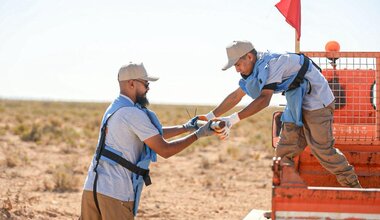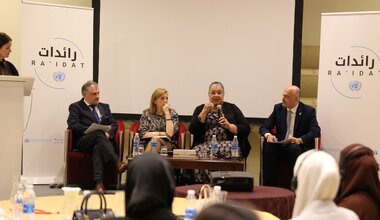Statement by Ghassan Salame, Special Representative of the Secretary General to Libya and Head of UNSMIL pursuant to Human Rights Council resolution 37/45
39th session of the Human Rights Council
Mr. President,
Distinguished Members of the Council,
I wish to thank you for inviting me to address the Human Rights Council. Further, I want to express my gratitude for permitting me to address the Council by recorded message.
While I would have been honoured to speak to this Council in person, the turmoil here in Tripoli prevents me from doing so.
On 26 August, violence broke out in the city as armed groups moved into direct conflict. Since then, at least one hundred and twenty Libyans have died and four hundred injured. Thousands of families’ resident in affected areas tried to flee to safety. IDP camps came under fire. The city was plunged into darkness and water is in short supply. Homes were looted. Armed groups carried-out abductions against civilians perceived as supporting their rivals. Critical infrastructure was severely damaged, including oil infrastructure.
On 4 September we brokered a ceasefire, resulting in a 10-day lull in hostilities. We made strides towards consolidating it on 9 September with concrete steps that aim to replace the armed groups controlling the Capital with regular police and military forces. The ceasefire consolidation agreement signed on 9 September envisages the withdrawal of armed groups from sovereign institutions and critical infrastructure.
The past arrangements in Tripoli had not brought real security to the capital, rather only created instability. However, we cannot replace one armed group with another, nor can we allow a coup d’état against the Government.
We have pushed for concrete and balanced steps to build the state security institutions, in a credible timeline. We are encouraging the Libyan authorities to revise the security arrangements in Tripoli to undo this intolerable and unsustainable status quo.
Excellencies
The events speak to a larger truth; security cannot remain in the grips of the armed groups but must be in the hands of the state.
The reign of armed groups is not limited to the Capital, it is just the most visible example. Across the country we see damaging, and often inhumane actions, at the hands of the armed groups.
In Libya, armed groups operate in a climate of impunity, appropriating law enforcement roles, including the powers to arrest, detain and interrogate suspects. They have held thousands of men, women and children in prolonged arbitrary detention; attacked and assaulted judicial officials; transferred detainees from one location to another at their whim; and committed torture and other human rights violations.
In various cities and towns, civilians are routinely grabbed off the streets or from their homes without legal process sometimes simply for holding the wrong opinion. Some reappear in prisons, where they are tortured. The bodies of others are recovered in the streets. Others simply join the long list of missing and disappeared since 2011. Expatriates are kidnapped, as we most recently saw in the southern city of Obari.
Human trafficking is routine in towns dotting up through the country. The smuggling of fuel is out in the open, as demonstrated by the convoys of trucks moving to the border. The armed groups have effectively seized control of refineries, harbours and powerplants across Libya.
Impunity must be challenged, and all grave violations must be punished accordingly. Sanctions must be imposed and perpetrators must be brought to the national courts or the International Criminal Court.
Mr. President,
In the East, armed groups associated with the Libyan National Army are also acting with near total impunity. Here too, there are various documented cases of unlawful killings, arbitrary detention and torture. Despite the ICC arrest warrant, Mahmoud al-Warfalli has yet to be handed over.
Earlier this year, the eastern city of Derna witnessed weeks of intense fighting leading to civilian casualties, damage to civilian facilities including hospitals and schools, and forced displacement. After most of the city came under the control of the Libyan National Army in June 2018, we have received consistent reports of pillage, destruction and appropriation of private property. Civilians from Derna, including medical professionals, local officials and activists have been arrested and remain detained.
The situation on the ground continues to be marked by grave violations of international human rights and humanitarian law, and outbreaks of violence. The main perpetrators of such violations and abuses are armed groups on all sides of the conflict, including those affiliated to the State or supporters of the Government of National Accord or Libyan National Army. Foreign mercenaries are used by various parties, in particular, but not limited to the South, of the country.
The forces across the country have been unable to guard against successive terrorist attacks, which have struck armed groups and civilian institutions alike. Most recently, the National Oil Corporation Headquarters was struck by IS, with two civilians killed and 45 injured. Since the start of this year, there have been over 57 people murdered by IS, in 14 separate incidents.
Other groups in situations of particular vulnerability in Libya include migrants, who face unimaginable suffering including unlawful killings, rape, torture, slavery, forced labour, extortion and exploitation. Such abuses are perpetrated by criminal networks as well as State actors and armed groups. They are holed up in detention centres, formal and informal, in various cities.
Perpetrators routinely violate human rights with little thought. They cannot imagine that they will be punished for their transgressions.
This confidence must be shattered. The sanctioning of six human traffickers was a good first step but must be followed by others. I call upon member states to exponentially escalate their efforts.
Excellencies,
The Mission has also been working to tackle the predatory economy and institute much-needed economic reforms. I have welcomed the new measures recently adopted by the Central Bank of Libya and the Government of National Accord, especially in relation to currency exchange rate and subsidy reforms, as the former had facilitated corruption in the past across the country.
The challenges described above can only be definitively tackled by an effective elected and accountable government.
The country is desperate for political leadership. The United Nations is not here to replace the government, but to support the authorities in Libya as they establish a democratic, functioning and prosperous state. However, we find few capable partners to support. Those elected parliamentarians of 2012 and 2014 who form the High State Council and House of Representatives hold only ambitions to remain in power indefinitely. The appointed Government of National Accord is underperforming and struggles to exist as others seek to crush it but provide no plausible alternative.
Over and over, the people of Libya have called for new elections to wash away these defunct bodies, and over and over, these calls have fallen on deaf ears or received insincere excuses.
I have briefed the Security Council that for National elections to take place a number of conditions must be met. They will require great effort to achieve; but they are achievable. I stand by this assessment. The Mission is working towards ensuring conditions conducive to free and fair national elections, with the support of the international community.
Excellencies,
On the implementation of the Resolution (37/45), the human rights component of UNSMIL has continued to monitor, document and report on the human rights situation in Libya. We intervene on individual cases at the national and international levels, seeking accountability and supporting victims. We have intensified the implementation of the Human Rights Due Diligence Policy on UN support to security forces, leading to engagement by different parts of the UN system with the Government on establishing internal oversight mechanisms. We encourage Member States to take a similar approach and ensure that their support is implemented with due diligence and measures are taken to mitigate the risks of Libyan security forces committing grave human rights violations.
We continue to work with national human rights organisations, seeking to strengthen their capacity to combat impunity. We facilitated direct support and rehabilitation to victims of human rights violations.
We continue to support the safe, dignified, voluntary and unconditional return of all IDPs to their homes, for example working to facilitate the return of those from Benghazi and Gheryan. For the estimated 40,000 Tawerghan IDPs, we continue to spare no effort advocating for their return, for the rehabilitation of their city and for reparations.
We document and report monthly on civilian casualties, which are usually caused by the indiscriminate use of wide-area impact weapons in densely-populated residential areas, as well as violations of international humanitarian law.
With regards to the situation of those detained arbitrarily, I wish to highlight in particular the situation of women detained in facilities without female guards, where they are at risk of sexual violence and exploitation. Of particular concern is the ongoing sexual violence against women migrants including in centres under the nominal control of State institutions, which exemplifies the crisis of impunity in the country.
Excellencies,
To conclude, on behalf of UNSMIL I would like to thank the Human Rights Council for its attention to Libya and to the crucial issue of combatting impunity. UNSMIL, in particular through its human rights component, remains ready to fully cooperate with the Human Rights Council, and its mechanisms, in seeking to end impunity. We stand ready to support visits of special procedures mandate holders to Libya, and back the appointment of a special rapporteur.
The road ahead will need united support to move the political process forward and improving the human rights and rule of law situation will be a vital element in ensuring its success.
Thank you.
 United Nations Peacekeeping
United Nations Peacekeeping UN
UN









